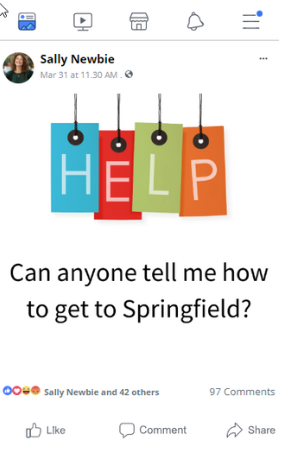How to Ask and Answer Genealogy Questions: An Analogy
Mar 30, 2023
When you have a genealogy question, do you know how to ask good questions to get the right answers that will have you successfully climbing your own family tree and not someone else’s?
What about those of you already deeply involved in the family history community? We see genealogy questions posted every day in Facebook and Instagram posts, Tweet threads, and YouTube comments. Do you know how to answer them the right way?
Over the last two decades I have seen tens of thousands of family history queries and cries for help from people of all skill levels. I have read through hundreds of thousands of comments and replies from (mostly) well-meaning family tree builders, eager to be of assistance. (Or maybe it’s just eagerness to be involved in the conversation.)
With all of this, I have learned that there are some very basic tips for asking genealogy questions to get us the answers we need to continue on our family history journey successfully. And, there are some very basic tips for answering questions that will ensure we are answering the right question with the right answer and not adding to the cacophony of confusion and irrelevant information that frequently appears in social media comment threads. To be contributing members of the genealogy community, we should review both sets of tips on a regular basis.
Before I give you those tips, let me share a little analogy that illustrates the problem. I see a whole lot of online conversations that go a little something like this. Maybe this looks familiar to you, too.

Ad nauseum for dozens of comments that end up with the original poster getting no real, helpful answer to their question.
To Be a Better Question Answerer
If someone asked you how to get to Springfield, would you just jump right in and start giving them directions? No. There are a few things that YOU need to know first.
Which Springfield do they want to go to?
Did you know that there are 41 different cities and towns in the U.S. alone with the name of Springfield. Before you assume that someone is asking about the place you are most familiar with, maybe you should ask them to share some specifics about where they want to go. (And you should probably make sure they don’t want to go to Springfield just because they heard about it on The Simpsons and didn’t realize that particular Springfield is not a real place.)
Where are they coming from?
When providing directions for how to get somewhere you need to know both the starting point and the ending point or you can’t possibly expect to help them successfully reach their destination. Before you jump in, ask clarifying questions so you understand where they are coming from.
Are they prepared with a mode of transportation?
Once you know where someone wants to go and where they are coming from, you also need to know more about their ability to get there. You could give them driving directions but what if they can’t drive? What if they can drive and they have a car but the car doesn’t have gas? Find out more about what they are working with before you send them on their way. Maybe the first set of instructions they really need is how to get to the local gas station. They are new. They don’t always know enough to know what to ask.
Were you able to connect the dots here between this analogy and questions that get asked in the family history community?
If you follow me around the genealogy Facebook groups at all, you know that I almost always ask clarifying questions before providing an answer. Let’s do more of that.
What are some examples of clarifying questions that you could ask the next time you want to comment on a Facebook post? Let me know in the comments below.
To Be a Better Question Asker
All of us were new at one point. And even those of us that aren’t new still get a little sloppy in our question asking from time to time. If you want to know how to get to your destination successfully, maybe provide a little more detail so you can get useful answers.
Which Springfield do you want to go to?
Where are you coming from?
What modes of transportation are available to you?
A better way to ask your question might look something like this:
I heard that there is a really great museum in Springfield, Illinois. I live just outside of Chicago, on the southside. I have all day Saturday to get there and back. But, I don’t have a car. Can anyone help provide me with information about what public transportation options are to get there and back and still have enough time to visit the museum?
With a post like that, the majority of the replies should be more useful to you. Now, how can you apply this analogy to asking good family history questions?
Want to practice asking good family history questions? Ask them in the comments below and I’ll reply with some pointers.
Oh, and here’s another couple of bonus tips. Always go back to your posts (the sooner the better) and answer any follow up questions people may have. And, don’t forget to say thank you for the help you receive.
TL;DR
If you ask better questions, you’ll get better answers.
If the question asker doesn’t know any better, show a little grace and ask them some clarifying questions before making assumptions about what they are asking. Otherwise, you run the risk of confusing them.
Follow me on Instagram where I share examples of how to make our family history questions and answers a little better.







